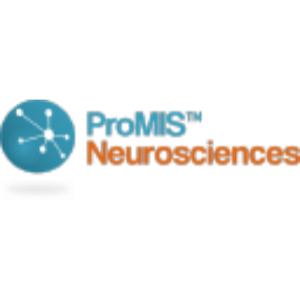ProMIS Neurosciences Announces First Quarter 2024 Financial Results and Recent Highlights
Rhea-AI Summary
ProMIS Neurosciences (Nasdaq: PMN) reported its Q1 2024 financial results and corporate updates. The company is progressing with its Phase 1a clinical trial of PMN310 for Alzheimer's disease (AD), expecting top-line data by mid-2024. The trial evaluates safety, tolerability, and pharmacokinetics in healthy volunteers. ProMIS also plans a Phase 1b study in H2 2024. Recent publications support PMN310’s potential. In the ALS program, PMN267 showed promising preclinical data. ProMIS selected PMN400 as a lead vaccine candidate for synucleinopathies. Financially, ProMIS reported a cash decrease to $2.5M, R&D expenses of $2.1M, G&A expenses of $1.6M, and a net loss of $3.6M.
Positive
- Progressing with Phase 1a clinical trial of PMN310 for Alzheimer's disease, with top-line data expected mid-2024.
- Plans to advance PMN310 into a Phase 1b multiple ascending dose study in H2 2024.
- Recent publications support the potential of PMN310 in treating Alzheimer's disease.
- Promising preclinical data for PMN267 in ALS published in the Journal of Biological Chemistry.
- Selection of PMN400 as a lead vaccine candidate for multiple synucleinopathies.
- Appointment of Neil Warma as interim CEO, bringing 25 years of leadership experience.
- Addition of key U.S. and international patent allowances to protect AD treatment therapeutics.
Negative
- Cash and cash equivalents decreased to $2.5 million as of March 31, 2024, down from $12.6 million as of December 31, 2023.
- Research and development expenses dropped to $2.1 million from $3.5 million in the same period in 2023.
- General and administrative expenses increased to $1.6 million compared to $1.4 million in the same period in 2023.
- Net loss was $3.6 million for Q1 2024, compared to $5.0 million for Q1 2023.
News Market Reaction 1 Alert
On the day this news was published, PMN declined 7.22%, reflecting a notable negative market reaction.
Data tracked by StockTitan Argus on the day of publication.
Top-line data from first-in-human Phase 1a clinical trial of PMN310 as a treatment for Alzheimer’s disease on track for mid-2024
CAMBRIDGE, Massachusetts and TORONTO, Ontario, May 14, 2024 (GLOBE NEWSWIRE) -- ProMIS Neurosciences Inc. (Nasdaq: PMN), a clinical-stage biotechnology company focused on the generation and development of antibody therapeutics targeting toxic misfolded proteins in neurodegenerative diseases such as Alzheimer’s disease (AD), amyotrophic lateral sclerosis (ALS) and multiple system atrophy (MSA), today announced financial results for the first quarter ended March 31, 2024 and provided a corporate update.
“We continue to make significant progress as we are nearing completion of the Phase 1a single ascending dose clinical trial of PMN310 in Alzheimer’s disease and remain on track to report top-line data mid-year,” stated Neil Warma, interim Chief Executive Officer of ProMIS Neurosciences. “Data recently published in bioRxiv support our conviction for PMN310 as a potential treatment for AD and highlight its high degree of selectivity for soluble toxic Ab oligomers and its differentiation from other Ab-directed antibodies. Moving forward, we plan to advance PMN310 into a Phase 1b multiple ascending dose study in the second half of 2024, subject to availability of sufficient resources, which could provide the first proof-of-concept data supporting PMN310’s efficacy and potential to improve clinical outcomes for patients with AD.”
Recent Highlights
Alzheimer’s Disease Program (PMN310)
PMN310, ProMIS’ lead candidate, is a humanized IgG1 antibody directed toward toxic amyloid-beta (Ab) oligomers (AβO) that are believed to be a major driver of AD.
- The ongoing Phase 1a clinical trial of PMN310 (Study NCT06105528) as a potential treatment for AD is a double-blind, placebo-controlled, single ascending dose study of the safety, tolerability, and pharmacokinetics of PMN310 infusions in five dosing cohorts of healthy volunteers. PMN310 exposure levels in blood and cerebrospinal fluid (CSF) are also being evaluated.
- ProMIS is on track to report top-line data from the Phase 1a portion of the study in mid-2024.
- In April 2024, the Company announced the publication of a paper titled, “Relationship between therapeutic activity and preferential targeting of toxic soluble aggregates by amyloid-beta-directed antibodies," in the online journal, bioRxiv. The study results support the differentiation of PMN310 from other Ab-directed antibodies. The publication can be accessed here.
Amyotrophic Lateral Sclerosis Disease Program (PMN267)
PMN267 is a humanized IgG1 antibody directed against toxic misfolded TDP-43 as a potential therapeutic target for ALS.
- In April 2024, ProMIS announced the publication of supportive preclinical data for PMN267 as a potential therapeutic agent for ALS in the Journal of Biological Chemistry in an article titled, “Tryptophan residues in TDP-43 and SOD1 modulate the cross-seeding and toxicity of SOD1." The publication can be accessed here.
Discovery Programs
- In January 2024, ProMIS announced the selection of a lead vaccine candidate, PMN400, against multiple synucleinopathies including MSA, Parkinson’s disease and Lewy Body Dementia.
- Using a proprietary computational platform, ProMIS identified potential conformational epitopes (misfolded portions) unique to toxic alpha-synuclein involved in synucleinopathies. Formulations of several of these epitopes were tested in mouse vaccination studies leading to PMN400’s selection as a lead vaccine candidate for testing in mouse models replicating cognitive and motor deficits of human disease.
Corporate
- In January 2024, ProMIS announced the appointment of Neil Warma as the interim Chief Executive Officer. Mr. Warma is a seasoned biotechnology executive with more than 25 years of leadership experience. Mr. Warma has served on the Company’s Board of Directors for the past two years and remains a director.
- In March 2024, the Company added key U.S. and international patent allowances to further protect the Company’s monoclonal antibody therapeutic for the treatment of AD.
First Quarter 2024 Financial Highlights
- Cash and cash equivalents were
$2.5 million as of March 31, 2024, compared to$12.6 million as of December 31, 2023. The decrease was primarily driven by payments on existing vendor obligations and the PMN310 phase 1a clinical study. - Research and development expenses were
$2.1 million for the three-months ended March 31, 2024, compared to$3.5 million for the same period in 2023. Research and development expenditures were primarily focused on the PMN310 phase 1a clinical study. - General and administrative expenses modestly increased to
$1.6 million for the quarter ended March 31, 2024, compared to$1.4 million for the same period in 2023. - Net loss was
$3.6 million for the quarter ended March 31, 2024, compared to a net loss of$5.0 million for the same period in 2023.
About ProMIS Neurosciences Inc.
ProMIS Neurosciences Inc. is a clinical stage biotechnology company focused on generating and developing antibody therapeutics selectively targeting toxic misfolded proteins in neurodegenerative diseases such as Alzheimer’s disease (AD), amyotrophic lateral sclerosis (ALS) and multiple system atrophy (MSA). The Company’s proprietary target discovery engine applies a thermodynamic, computational discovery platform - ProMIS™ and Collective Coordinates - to predict novel targets known as Disease Specific Epitopes on the molecular surface of misfolded proteins. Using this unique approach, the Company is developing novel antibody therapeutics for AD, ALS and MSA. ProMIS has offices in Cambridge, Massachusetts and Toronto, Ontario.
Forward-Looking Statements
Nasdaq has not reviewed and does not accept responsibility for the adequacy or accuracy of this release. Certain information in this news release constitutes forward-looking statements and forward-looking information (collectively, “forward-looking information”) within the meaning of applicable securities laws. In some cases, but not necessarily in all cases, forward-looking information can be identified by the use of forward-looking terminology such as “plans”, “targets”, “expects” or “does not expect”, “is expected”, “excited about”, “an opportunity exists”, “is positioned”, “estimates”, “intends”, “assumes”, “anticipates” or “does not anticipate” or “believes”, or variations of such words and phrases or state that certain actions, events or results “may”, “could”, “would”, “might”, “will” or “will be taken”, “occur” or “be achieved”. In addition, any statements that refer to expectations, projections or other characterizations of future events or circumstances contain forward-looking information. Specifically, this news release contains forward-looking information relating to the progress of the Company’s Phase 1a study and anticipated top-line data readout for the Phase 1a study in mid-2024, plans to advance PMN310 into a Phase 1b MAD study in AD patients, the potential for such studies to provide the first proof-of-concept data for PMN310, the potential that PMN310 has the potential to positively benefit patients with AD, the targeting of toxic misfolded proteins in neurodegenerative diseases that the Company believes may directly address fundamental AD pathology (including the belief and understanding that toxic oligomers of Aβ are a major driver of AD) and have greater therapeutic potential due to reduction of off-target activity, a computationally-derived Aβ vaccine for AD and the Company’s PMN310 antibody and vaccine candidate, management’s belief that its patented platform technology has created an antibody candidate specific to toxic misfolded oligomers known to be present in AD, therapeutic activity and preferential targeting of toxic soluble aggregates by Aß-directed antibodies and the potential implications thereof, the Company’s pipeline, including application of its platform to other diseases, statements, the progression of earlier stage antibody candidates for multiple synucleinopathies including MSA, Parkinson’s disease and Lewy Body Dementia, preclinical data, including data recently announced regarding ALS, the ability to continue its growth and realize the anticipated contribution of the members of its board of directors and executives to its operation and progress, use of capital expenses, future accumulated deficit and other financial results in the future, ability to fund operations, the ability to maintain enough liquidity to execute its business plan and its ability to continue as a going concern. Statements containing forward-looking information are not historical facts but instead represent management's current expectations, estimates and projections regarding the future of our business, future plans, strategies, projections, anticipated events and trends, the economy and other future conditions. Forward-looking information is necessarily based on a number of opinions, assumptions and estimates that, while considered reasonable by the Company as of the date of this news release, are subject to known and unknown risks, uncertainties and assumptions and other factors that may cause the actual results, level of activity, performance or achievements to be materially different from those expressed or implied by such forward-looking information, including, but not limited to, the risk that preclinical results or early results may not be indicative of future results, the Company’s ability to fund its operations and continue as a going concern, its accumulated deficit and the expectation for continued losses and future financial results. Important factors that could cause actual results to differ materially from those indicated in the forward-looking information include, among others, the factors discussed throughout the “Risk Factors” section of the Company's most recently filed Annual Report on Form 10-K for the year ended December 31, 2023 and in its subsequent filings filed with the United States Securities and Exchange Commission. Except as required by applicable securities laws, the Company undertakes no obligation to publicly update any forward-looking information, whether written or oral, that may be made from time to time, whether as a result of new information, future developments or otherwise.
For further information:
Visit us at www.promisneurosciences.com
Please submit media inquiries to info@promisneurosciences.com
For Investor Relations, please contact:
Stern Investor Relations
Anne Marie Fields, Managing Director
annemarie.fields@sternir.com
Tel. 212-362-1200
PROMIS NEUROSCIENCES INC.
Condensed Consolidated Balance Sheets
(expressed in US dollars, except share amounts)
(Unaudited)
| March 31, | December 31, | ||||||||
| 2024 | 2023 | ||||||||
| Assets | |||||||||
| Current assets: | |||||||||
| Cash | $ | 2,496,973 | $ | 12,598,146 | |||||
| Short-term investments | 32,358 | 32,358 | |||||||
| Prepaid expenses and other current assets | 1,018,969 | 988,641 | |||||||
| Total current assets | 3,548,300 | 13,619,145 | |||||||
| Total assets | $ | 3,548,300 | $ | 13,619,145 | |||||
| Liabilities and Shareholders' Equity (Deficit) | |||||||||
| Current liabilities: | |||||||||
| Accounts payable | $ | 1,403,592 | $ | 7,843,136 | |||||
| Accrued liabilities | 1,242,322 | 1,506,526 | |||||||
| Total current liabilities | 2,645,914 | 9,349,662 | |||||||
| Share-based compensation liability | 716,969 | 422,002 | |||||||
| Warrant liability | 108,318 | 94,185 | |||||||
| Total liabilities | 3,471,201 | 9,865,849 | |||||||
| Commitments and contingencies | |||||||||
| Shareholders' equity (deficit): | |||||||||
| Series 2 Convertible Preferred Shares, no par value, unlimited shares authorized, 1,166,667 shares issued and outstanding as of March 31, 2024 and December 31, 2023 | — | — | |||||||
| Common shares, no par value, unlimited shares authorized, 18,961,116 and 18,885,254 shares issued and outstanding as of March 31, 2024 and December 31, 2023, respectively | — | — | |||||||
| Additional paid-in capital | 97,549,317 | 97,590,426 | |||||||
| Accumulated other comprehensive loss | (371,184 | ) | (371,184 | ) | |||||
| Accumulated deficit | (97,101,034 | ) | (93,465,946 | ) | |||||
| Total shareholders' equity (deficit) | 77,099 | 3,753,296 | |||||||
| Total liabilities and shareholders' equity (deficit) | $ | 3,548,300 | $ | 13,619,145 | |||||
PROMIS NEUROSCIENCES INC.
Condensed Consolidated Statements of Operations and Comprehensive Loss
(expressed in US dollars, except share amounts)
(Unaudited)
| For the | For the | ||||||||
| Three Months Ended | Three Months Ended | ||||||||
| March 31, | March 31, | ||||||||
| 2024 | 2023 | ||||||||
| Operating expenses: | |||||||||
| Research and development | $ | 2,123,778 | $ | 3,510,252 | |||||
| General and administrative | 1,552,873 | 1,460,419 | |||||||
| Total operating expenses | 3,676,651 | 4,970,671 | |||||||
| Loss from operations | (3,676,651 | ) | (4,970,671 | ) | |||||
| Other income (expense): | |||||||||
| Change in fair value of financial instruments | (14,132 | ) | (41,665 | ) | |||||
| Interest expense | (76,775 | ) | — | ||||||
| Other income | 132,470 | 52,905 | |||||||
| Total other income (expense), net | 41,563 | 11,240 | |||||||
| Net loss | (3,635,088 | ) | (4,959,431 | ) | |||||
| Other comprehensive loss | |||||||||
| Foreign currency translation adjustment | — | (4,354 | ) | ||||||
| Comprehensive loss | $ | (3,635,088 | ) | $ | (4,963,785 | ) | |||
| Net loss per share, basic and diluted | $ | (0.19 | ) | $ | (0.58 | ) | |||
| Weighted-average shares outstanding of common shares, basic and diluted | 19,533,976 | 8,579,284 | |||||||









